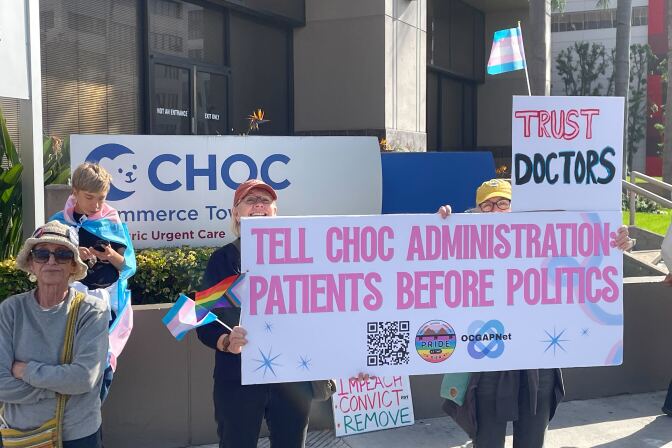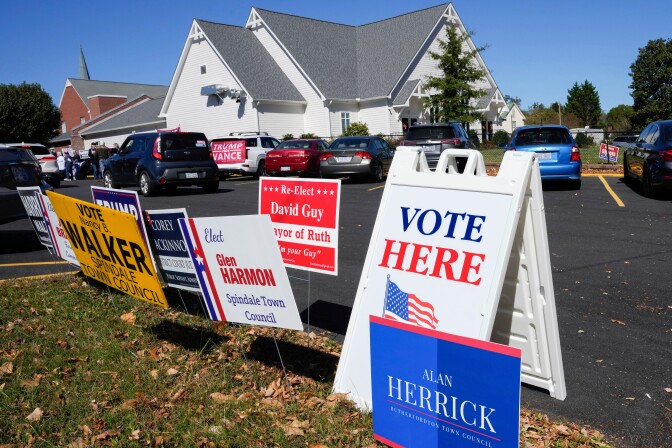House Republicans rushed to approve legislation on Wednesday that would impose strict new proof-of-citizenship requirements ahead of the midterm elections, a long shot Trump administration priority that faces sharp blowback in the Senate.
The bill, called the Safeguard American Voter Eligibility, or SAVE America Act, would require Americans to prove they are citizens when they register to vote, mostly through a valid U.S. passport or birth certificate. It would also require a valid photo identification before voters can cast ballots, which some states already demand. It was approved on a mostly party-line vote, 218-213.
Republicans said the legislation is needed to prevent voter fraud, but Democrats warn it will disenfranchise millions of Americans by making it harder to vote. Federal law already requires that voters in national elections be U.S. citizens, but there's no requirement to provide documentary proof. Experts said voter fraud is extremely rare, and very few noncitizens ever slip through the cracks. Fewer than one in 10 Americans don't have paperwork proving they are citizens.
"Some of my colleagues will call this voter suppression or Jim Crow 2.0," said Rep. Bryan Steil, R-Wis., presenting the package at a committee hearing.
But he said "those allegations are false," and he argued the bill is needed to enforce existing laws, particularly those that bar immigrants who are not citizens from voting. "The current law is not strong enough," he said.
Election turmoil shadows the vote
The GOP's sudden push to change voting rules at the start of the midterm election season is raising red flags, particularly because President Donald Trump has suggested he wants to nationalize U.S. elections, which, under the Constitution, are designed to be run by individual states.
The Trump administration recently seized ballots in Georgia from the 2020 election, which the president insists he won despite his defeat to Democrat Joe Biden. The Department of Justice is demanding voter rolls from states, including Michigan, where a federal judge this week dismissed the department's lawsuit seeking the voter files. Secretaries of state have raised concerns that voters' personal data may be shared with Homeland Security to verify citizenship and could result in people being unlawfully purged from the rolls.
"Let me be clear what this is about: It's about Republicans trying to rig the next election," said Rep. Jim McGovern of Massachusetts, the top Democrat on the Rules Committee, during a hearing ahead of the floor vote. "Republicans are pushing the Save America Act because they want fewer Americans to vote. It's that simple."
The legislation is actually a do-over of a similar bill the House approved last year, which also sought to clamp down on fraudulent voting, particularly among noncitizens. It won the support of four House Democrats, but stalled in the Republican-led Senate. Only one Democrat, Rep. Henry Cuellar of Texas, voted for the revised bill.
This version toughens some of the requirements further, while creating a process for those whose names may have changed, particularly during marriage, to provide the paperwork necessary and further attest to their identity.
It also requires states to share their voter information with the Department of Homeland Security, as a way to verify the citizenship of the names on the voter rolls. That has drawn pushback from elections officials as potentially intrusive on people's privacy.
Warnings from state election officials
The new rules in the bill would take effect immediately, if the bill is passed by both chambers of Congress and signed into law.
But with primary elections getting underway next month, critics said the sudden shift would be difficult for state election officials to implement and potentially confuse voters.
Voting experts have warned that more than 20 million U.S. citizens of voting age do not have proof of their citizenship readily available. Almost half of Americans do not have a U.S. passport.
"Election Day is fast approaching," said Sen. Lisa Murkowski, R-Alaska. "Imposing new federal requirements now, when states are deep into their preparations, would negatively impact election integrity by forcing election officials to scramble to adhere to new policies likely without the necessary resources."
The fight ahead in the Senate
In the Senate, where Republicans also have majority control, there does not appear to be enough support to push the bill past the chamber's filibuster rules, which largely require 60 votes to advance legislation.
That frustration has led some Republicans, led by Sen. Mike Lee of Utah, to push for a process that would skip the 60-vote threshold in this case, and allow the bill to be debated through a so-called standing filibuster — a process that would open the door to potentially endless debate.
Lee made the case to GOP senators at a closed-door lunch this week, and some said afterward they are mulling the concept.
"I think most people's minds are open," said Sen. John Kennedy, R-La., "My mind's certainly open."
But Murkowski of Alaska said she is flat out against the legislation.
"Not only does the U.S. Constitution clearly provide states the authority to regulate the 'times, places, and manner' of holding federal elections, but one-size-fits-all mandates from Washington, D.C., seldom work in places like Alaska," she said.
Karen Brinson Bell of Advance Elections, a nonpartisan consulting firm, said the bill adds numerous requirements for state and local election officials with no additional funding.
"Election officials have a simple request of Congress — that you help share their burdens not add to them," she said.
Copyright 2026 NPR















